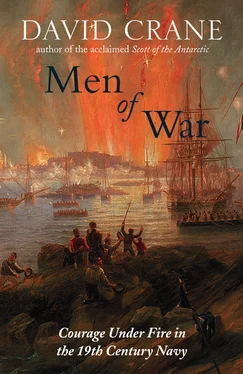Courage Under Fire in the Nineteenth-Century Navy
DAVID CRANE
Dedication Dedication Introduction: Hastings’s Sword Hastings: The Happy Warrior Peel: A Verray Parfit Gentil Knyght Goodenough: The Sword of the Lord Epilogue Acknowledgements Notes Select Bibliography Index By the Same Author Copyright About the Publisher
For my Mother and Father
Cover
Title Page MEN OF WAR Courage Under Fire in the Nineteenth-Century Navy DAVID CRANE
Dedication Dedication Dedication Introduction: Hastings’s Sword Hastings: The Happy Warrior Peel: A Verray Parfit Gentil Knyght Goodenough: The Sword of the Lord Epilogue Acknowledgements Notes Select Bibliography Index By the Same Author Copyright About the Publisher For my Mother and Father
Introduction: Hastings’s Sword
Hastings: The Happy Warrior
Peel: A Verray Parfit Gentil Knyght
Goodenough: The Sword of the Lord
Epilogue
Acknowledgements
Notes
Select Bibliography
Index
By the Same Author
Copyright
About the Publisher
Introduction
Hastings’s Sword
My sword, I give to him that shall succeed me in my pilgrimage, and my courage and skill, to him that can get it.
John Bunyan, The Pilgrim’s Progress
The boast of heraldry, the pomp of pow’r,
And all that beauty, all that wealth e’er gave,
Awaits alike th’inevitable hour,
The paths of glory lead but to the grave.
Thomas Gray,
‘Elegy Written in a Country Churchyard’
I FIRST CAME ACROSS the idea for this book fifteen years ago in the British School in Athens while working on a biography of Edward Trelawny. I was going through the archive of the great philhellene and historian of Greece, George Finlay, and in among his papers was the draft will of an ex-English naval officer and hero of the Greek War of Independence called Frank Abney Hastings.
It seemed that almost nothing was known of Hastings before he arrived in Greece – aristocratic connections, Trafalgar at the age of eleven, a row with his superiors that brought his career with the Royal Navy to a premature end – but it was the will rather than the man that grabbed my attention. Like almost every document that Hastings ever left it is heavily scored and corrected, but in among a few minor bequests to a servant and friends was a single clause – the gift of an inscribed sword with instructions that it was to be passed down the generations from officer to officer in perpetuity – that seemed to conjure not just a man but a whole world and tradition into vivid and immediate life.
Memory has a way of improving, or at least ‘tidying’ things, and when I went back to the archive some years later the clause was both less elegant and more robust than I had recalled. In it Hastings nominates a man called Edward Scott, 1st Lieutenant of the Cambrian , ‘the finest officer’ he had ever served with, as his beneficiary, with the rider that
he will cause to be inscribed on the blades of my swords and on the Barrels of my Fire arms the following words. Viz ‘This /Gun/ Pistol or sword (as the case may be) was bequeathed by Frank Abney Hastings to his former Messmate Captain Edward Scott RN and I further request of the said Edward Scott that these arms and my Nautical Instruments and my watch, may never be sold but that he should bequeath them to that Naval Officer whose Skill and Valour he most admires.
There is something gloriously immodest and extravagant about this that is typical of Hastings – as if Achilles had bequeathed his shield and sword, and then, what the hell, thrown in his helmet and greaves for good measure – but for all that the idea is still a profoundly generous one. There was nothing unusual in one officer presenting a commemorative sword to another in this way, but what Hastings’s bequest enshrines is not so much a memorial to himself as an idea of naval service that links generation to generation in an organic tradition of ‘Skill’ and ‘Valour’ in which he himself formed one small but brilliant link.
And in spite of the fact that Hastings is now virtually unknown in the country of his birth – and scarcely remembered in the country of his adoption – no nineteenth-century naval officer so boldly carried the torch. It used to be said by a rueful Spanish ambassador that every English captain an enemy faced was a Nelson, and if that is about as accurate as most generalisations about the Royal Navy, it is probably truer of Hastings than it was of any young officer of his generation who learned his trade during the last decade of the Napoleonic Wars.
‘Who is the happy Warrior? Who is he, That every man in arms should wish to be?’ asked Wordsworth, and almost a century before Herbert Read found his own savage answer in the trenches of Flanders, Hastings triumphantly filled the bill. It is possible that he had other interests than fighting and the art of war, but born as he was in the first year of the conflict with Revolutionary France he never knew or seemed to want anything else, fighting against Napoleon and the United States for as long as there were battles to be fought, before transferring his allegiances and genius to the nascent Greece in her struggle for independence from Ottoman oppression.
Hastings has only himself to blame that he is not better known, but as the architect and captain of the first successful steam warship and the great prophet of gunnery and total war, he was the unacknowledged godfather to everything that was bloodiest in the century ahead. ‘Great Britain is especially called upon to acknowledge her obligations to Captain Hastings,’ George Finlay wrote with premature optimism in 1845, at a time when the Royal Navy was tardily implementing the revolutionary lessons Hastings had given the world’s navies almost twenty years before.
By rendering naval warfare not only more destructive, but at the same time making it more dependent on a combination of good gunnery and mechanical knowledge with profound naval skill, he has increased the naval power of Great Britain, where all those qualities are cultivated in the highest degree. At the same time, the civilized world is indebted to him for rendering battles so terrible as to henceforth be less frequent, and for putting an end to naval warfare as a means of amusing kings, and gratifying the ambition of princely admirals, or vainglorious states.
It would have been fun to hear Hastings’s response to these pieties – he could have started a sea battle in a dry-dock – but for all the brutal realism with which he approached the business of war, his friendship with Edward Scott suggests that he was not immune to the navy’s more dashing and chivalrous traditions. ‘SCOTT. (CAPTAIN, 1838)’ Scott’s entry in O’Byrne’s 1848 Dictionary of Naval Officers begins, and nothing could speak more eloquently of the depths of the tradition he represented than that a career of such variety and distinction should now be so utterly and irrecoverably lost:
EDWARD HINTON SCOTT was born about 1789. This officer entered the navy in May, 1798, as Fst. Cl. Vol. on board the ANSON … With five of the [enemy] frigates … she came, 12 Oct., singly into collision, and sustained a loss, with injury to her masts and yards, of 2 men killed and 13 wounded. On 18 of the same month we find her, in company with the KANGAROO 18, enduring a similar loss in a gallant action of an hour and a quarter which terminated in the capture of La Loire of 46 guns and 664 men … While attached to the ANSON Mr Scott contributed, also, to the capture of several fine privateers … In the course of the same year he commanded a rocket-vessel in Sir Sidney Smith’s attack on the Boulogne flotilla.
Читать дальше











